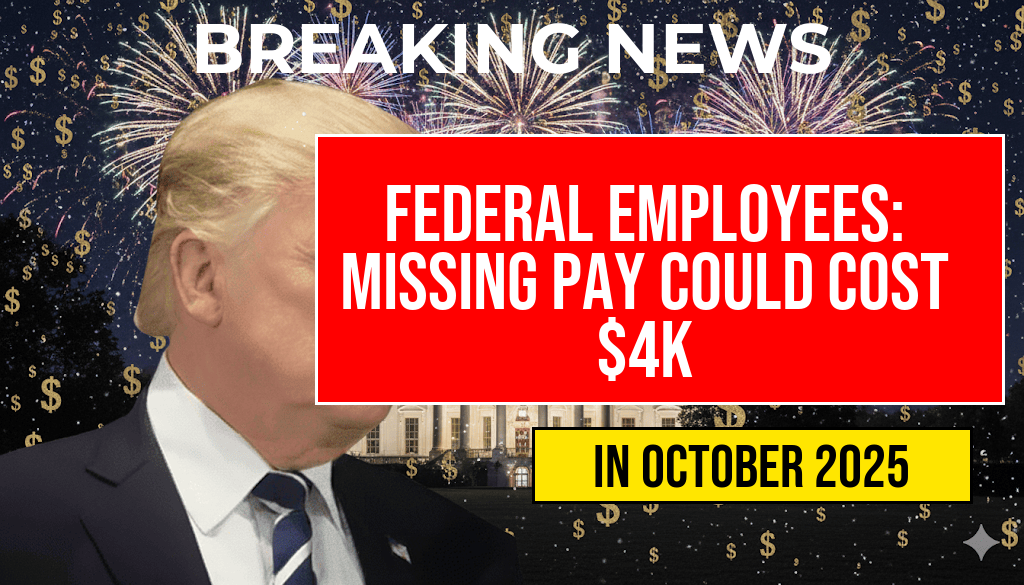Federal employees facing delays in their paychecks due to government shutdowns or delays in appropriations may find themselves in urgent financial distress. Missing two paychecks can result in losses reaching up to $4,000 for a GS-12 employee, depending on their pay grade and allowances. This situation not only impacts daily expenses but can also jeopardize credit scores and financial stability. With the potential for delayed payments to extend over several pay periods, federal workers need to understand their rights, available resources, and immediate steps to mitigate financial hardship.
Understanding the Impact of Missing Paychecks for Federal Employees
Federal employees are typically paid on a biweekly schedule, with most receiving their paychecks every two weeks. When a government shutdown or funding lapse occurs, paychecks can be delayed or missed entirely. For a GS-12 employee, whose basic pay starts at approximately $71,674 annually (as of 2023), missing two paychecks can amount to roughly $5,500, but after taxes and deductions, the net loss could be closer to $4,000. This sum can significantly disrupt mortgage payments, utility bills, and day-to-day expenses.
While some federal employees have access to emergency savings or federal assistance programs, many are unprepared for such financial setbacks. The situation becomes more complex for employees with dependents or existing financial commitments. Delays in pay often lead to late fees, penalties, and damage to credit standings, further complicating their financial health.
Legal Protections and What Federal Employees Can Do
Legal Rights During Pay Delays
The Fair Labor Standards Act and related federal employment statutes obligate agencies to compensate employees for work performed, but extraordinary circumstances like shutdowns can temporarily disrupt this obligation. During shutdowns, the Office of Personnel Management (OPM) states that employees will generally be paid once funding resumes, but this may not happen immediately.
Some federal employees are classified as excepted or non-excepted, affecting whether they are required to work without pay or are furloughed. Exceptions may allow certain employees to continue working without pay during a shutdown, but even then, delayed payments can occur. Employees should consult their agency’s human resources department or legal counsel for specific guidance.
Immediate Steps for Affected Federal Employees
- Review Pay Stubs and Notices: Confirm the status of upcoming payments and any official communications from payroll or HR departments.
- Contact Agency Payroll Office: Seek clarification on when paychecks will be issued and whether any interim measures are available.
- Assess Financial Needs: Prioritize essential expenses such as rent, utilities, and groceries. Consider negotiating payment plans with creditors if necessary.
- Explore Emergency Assistance Programs: Some agencies or unions offer hardship funds or interest-free loans. The Federation of Government Employees and similar organizations can be valuable resources.
- Leverage Federal Employee Benefits: Employees can access certain healthcare and financial programs that may provide temporary relief.
- Seek External Financial Support: Nonprofits, community organizations, and local banks sometimes offer emergency grants or low-interest loans for federal workers.
Options for Mitigating Financial Hardship
Utilize Savings and Budget Adjustments
Employees with emergency savings should consider using these funds judiciously to cover critical expenses. Those without savings may need to re-evaluate their budgets, cut discretionary spending, and postpone non-essential payments until paychecks are received.
Negotiate Payment Arrangements
Many utility companies, landlords, and lenders are willing to work out temporary payment plans for those experiencing financial hardship. Communicating proactively can prevent service disruptions and late fees.
Apply for Assistance Programs
| Program | Description | Link |
|---|---|---|
| Federal Employee Emergency Relief Fund | Offers grants and interest-free loans to federal workers facing financial emergencies. | https://federationofgove rnemployees.org/relief |
| Community Action Agencies | Local organizations providing utility assistance, rent support, and food programs. | https://communityactionpartnership.com |
| Federal Emergency Management Agency (FEMA) | Assists with disaster-related financial needs, including government shutdown emergencies. | https://www.fema.gov |
Long-Term Considerations and Preventive Measures
Federal workers are advised to establish or strengthen emergency savings to buffer against future disruptions. Maintaining an up-to-date budget, understanding available agency resources, and staying informed about government funding statuses can help mitigate the impact of unforeseen funding lapses.
Additionally, federal employees should consider consulting financial advisors or credit counselors to develop strategies for handling income interruptions. Being proactive ensures that even in uncertain times, employees can better safeguard their financial stability.
For ongoing updates on government shutdowns and federal employee rights, trusted sources such as the Office of Personnel Management and reputable news outlets remain essential references.
Frequently Asked Questions
What should federal employees do if they miss two paychecks?
If federal employees miss two paychecks, they should immediately contact their agency’s payroll or human resources department to understand the cause and explore options for resolving the issue promptly.
How could missing two paychecks impact a GS-12 employee financially?
Missing two paychecks can result in a financial loss of up to $4,000 for a GS-12 employee, affecting their ability to cover essential expenses and potentially leading to late payments or penalties.
What are common reasons for missing federal paychecks?
Common reasons include administrative errors, delays in payroll processing, changes in employment status, or issues with direct deposit setup. Employees should verify their payroll information regularly.
What steps can federal employees take to prevent paycheck issues?
Employees should ensure their payroll information is accurate and up to date, review their pay stubs regularly, and communicate promptly with HR or payroll departments if discrepancies arise to prevent missed payments.
When should federal employees seek legal or financial advice regarding missed paychecks?
Employees should seek legal or financial advice if they experience prolonged payment issues, if their paychecks are consistently delayed, or if they face significant financial hardship due to missed payments.






